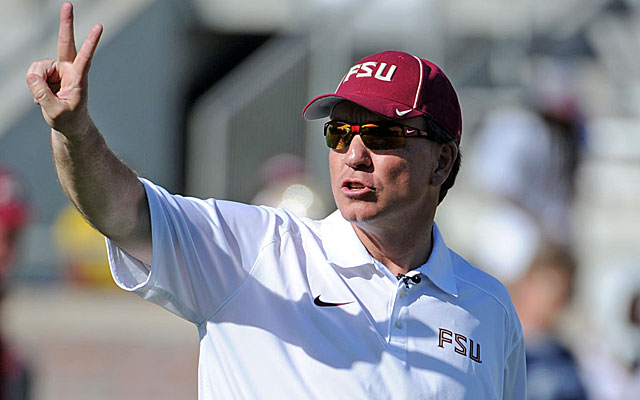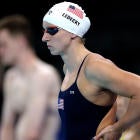
More college football: Jon Solomon | Dennis Dodd | Jeremy Fowler | Latest news
Jimbo Fisher has a strange way of getting to the point.
The Florida State coach has embraced a sports science that he directly credits for last season's national championship. It is both mysterious and effective. It's also from Australia.
That gets Fisher going on our nation's global athletic positioning.
"Here's my philosophy in America," the coach began. "We're spoiled. We have the largest gene pool of athletes in the world. When one breaks down we say, 'Go get another one.'
"The toy isn't broke, don't fix it. All these other countries and all these other sports, how do they beat us and don't have the caliber of athlete?"
"They're ahead in training."
Otherwise, Fisher is gushing because as far as he is concerned Florida State is catching up in its own corner of the world. The coach has no problem directly attributing some of the Seminoles' 2013 success to Catapult GPS. The physiological/biological player monitoring system from Down Under is blowing up in the NFL and college.
Fisher said the Noles suffered 88 percent less soft-tissue injuries last season using Catapult. That's less pulls, less tears, more front-line players on the field.
Catapult is more than happy to ride the wave of hype. It is the hip player development tool of the moment.
| What is Catapult? |
| Catapult is aphysiological/biological monitoring device that allows coaches and trainers to know who is overworked and economize practice by removing the guesswork with scientific performance management. It compares athletes, sessions, weeks and seasons and stops the guessing. For more information, check out: http://www.catapultsports.com/united-states/ |
Those who use it, though, aren't exactly sharing. Half of Catapult's 14 NFL clients can't be mentioned according to Gary McCoy, one of the company's sports scientists. The company's own website calls it "The Most Used Secret In Sport."
Catapult counts five college football programs that have at least played in a BCS bowl since 2010 as clients. FSU, Oregon and LSU have played for national championships since that year. Baylor and Central Florida played in last season's Fiesta Bowl.
"It is to strength and conditioning," said fellow convert Tommy Moffitt, the LSU strength coach, "what the barbell was 40 or 50 years ago."
Simply put, Catapult compiles live data relating to exertion and performance. Players wear a sports bro -- it resembles a female sports bra -- that contains a GPS monitor.
The technology tracks a thousand data points a second. If FSU receiver Rashad Greene isn't feeling it one day in practice, it may be because he is worn down, not because he is dogging it. Based on that information, coaches won't push him, they'll understand him.
The technology is so new -- Fisher says misunderstood -- the NCAA does not allow it to be utilized in games.
"Catapult is an interesting concept," NCAA chief medical officer Brian Hainline wrote in an email. "We are awaiting better scientific validation."
To that Fisher almost literally turns up his nose. He wants to be able to use the in-game technology now.
"They say it's a competitive advantage," Fisher said. "They don't know enough about it."
While the system is growing popular among trainers, sports scientists and coaches in the know, there's that secrecy factor. Teams using it are not exactly sharing information. Maybe that's the football culture. Maybe it's because the technology is so revolutionary none of them have figured it out yet.
Perhaps both.
"It's against everything as a football coach I ever believed," Fisher said.
Asked if he allows other schools to come in to study Catapult, Fisher suddenly got quiet. Ushering two reporters into a hotel conference room, he said, "I think it's a huge advantage for us. I don't even care if I told ya'll. Y'all figured it out."
The concept would be less interesting if FSU hadn't beaten Auburn. Kentucky is heavily involved with Catapult. So is Cal. The term "cutting-edge" hasn't been attached to either program's football lately.
"We're going to win football games," Kentucky high performance coach Erik Korem said. "[But] just because we have a performance program doesn't mean you're going to win the national championship."
It does mean Catapult gains credibility when Jimbo Fisher is continually pumping it.
Football tends to be linear, conservative. Free thinking isn't much tolerated. More or less everybody does the same drills, the same way.
Catapult takes into account individuals. Each player has a "dashboard" that shows his "max load." If a player gets to -- or surpasses -- that number, Fisher and his cadre of analysts know enough to back off.
The coach said that has earned him a new level respect among the players.
"The trust factor between us has grown tremendously," he said.
Fisher has no problem being the lead college apostle for Catapult. It was developed by the Australian Institute of Sport in the late 1990s. It is still in the process of making it to these shores.
"I was the first one to ever do it," Fisher crowed. "We're trying to keep an attitude of domination."
American football is the perfect incubator for marketing McCoy's product. He calls our sport "the duckbill platypus" of athletics.
"This is the only place in the world it is found," the 49-year old senior sports scientist said. "They've [FSU] done a better job than anybody with the utilization. They took a year and analyzed everything."
The possibilities are so profound that this story suggests the technology could convince the NFL Players Association an 18-game NFL season is viable.
For the same reasons might some day Catapult help convince the college playoff police that an eight-team bracket makes sense?
Two years ago, Korem was a 31-year strength and conditioning whiz at FSU. Kentucky head coach Mark Stoops immediately snapped up Korem when the former FSU defensive coordinator went to the Wildcats in 2012.
When they arrived at Kentucky there wasn't a player who ran 20 mph. Soon after -- partially because of Catapult -- the skill players alone were averaging 21.7 mph.
That's an extra 2½ feet per second.
Korem's Kentucky title probably makes him the only "high performance coach" in college athletics. A couple of years ago he traveled with friend and New York Giants strength coach Joe Danos to Australia. His eyes were opened.
"We're behind the times," Korem said of the US. "The old Soviets, the reason they were kicking our teeth in, they didn't have better athletes. They were better at everything else."
Korem agreed with his old boss, Jimbo:
"If you're an elite, big-time football school and Player A doesn't work out, roll Player B in. In a country like Australia, they don't have all these great athletes. They maximize what they have."
Catapult was first used in Australian rules football, a sport McCoy calls "the most physiologically demanding on the planet."
"We were able to manage this thing called fatigue," McCoy said.
It is all a bit unconventional. If players can get past the whole sports bro thing, they become finely tuned test subjects. Safer. Better prepared. On the FSU sideline are analysts with laptops recording their information, managing Excel spreadsheets on each player.
"It's on my desk every morning," Fisher said.
There's the ultimate selling point: Catapult makes it less likely a player will be pushed to the point of injury -- or worse.
"I think it will take a long time for everybody to get to this position," Korem said. "It's not just buying technology, it's knowing how to leverage it."
"It's really based on your imagination," Moffitt said.
A national championship may have grown out of the sweltering heat of last year's summer drills. There they were, a bunch of sweating Seminoles running around in sports bros. They were monitored by coaches, trainers and laptops.
They were hot but they weren't overheated.
"Know how many IVs we gave in August last year?" Fisher boasted one more time. "One."
















